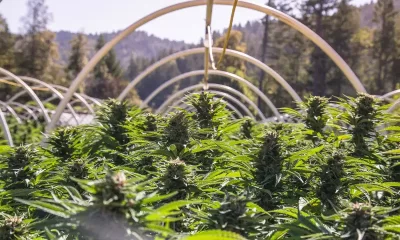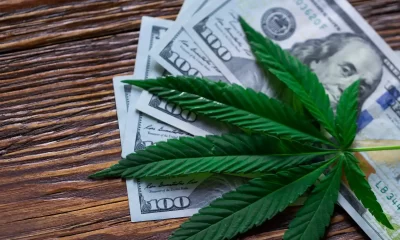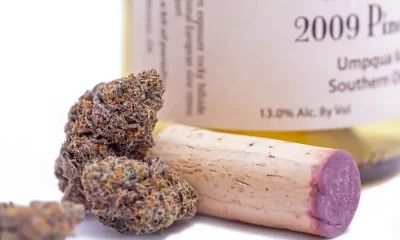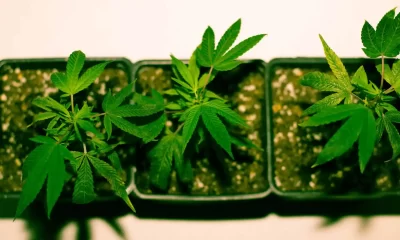Business
Is Human Trafficking Really Fueling the Cannabis Industry? – The Story Behind the Flashy Headline

Is Human Trafficking really fueling the Cannabis Industry?
NBC recently released a story claiming that “Human Trafficking is Fueling the Legal Cannabis Industry”…so I decided to fact check them!
Well, I won’t necessarily Fact Check them, but rather analyze their claims and see whether or not they are stretching the narrative to fit their alarmist views on cannabis.
Also, if you’re thinking “cannabis” and “human trafficking”, an idea of a Latin American migrant comes to mind…well, you’d be wrong in that assessment.
Before we get to the story, I would like to talk about why I’m covering this topic. Firstly, I have been aware of the horrors of human trafficking for over fifteen years. My partner – who’s a psychoanalyst – treated trafficked victims when she started out.
I worked on their campaigns to raise money and it was then when I learned that Human Trafficking is the second largest illicit market in the world trailing only after drug trafficking.
This is one of the reasons why I am so staunchly in favor of legalizing all drugs! If we could use the same resources we spend on prohibiting drugs to actually stopping human trafficking – the world would be a better place. If we could use the legal drug trade to help fuel this endeavor – we’re winning as a global society!
The sad truth however is that those who have the means to “buy people”, whether as illegal workers or for sex trafficking – they tend to enjoy the fact that law enforcement chooses to go after people who at the very most “harm themselves” instead of them.
“About 10,000 children a year suffer the horrors of commercial sexual exploitation in the United States. Each victim on average is forced to have sex more than five times a day.
Yet the buyers who fuel the child sex trade are seldom held accountable. Most just blend back into their families, jobs and neighborhoods. Until the next time. – Source: USA TODAY”
That’s only in the US. Around the world it’s closer to 1,000,000 children per year who are being trafficked and this only seems to be increasing.
“Despite 20 years of efforts, the sexual exploitation of children in travel and tourism has expanded across the globe and outpaced every attempt to respond at the international and national level… As a result, the risks of child sexual exploitation are increasing.”
— The Global Study on Sexual Exploitation of Children in Travel and Tourism, 2016.
Yet this is child trafficking. Then there’s “Labor trafficking” which is a whole other story. In fact, this is what the NBC story about the illegal marijuana grow facilities were about.
The NBC Human Trafficking Angle
In the video, you see a convoy of police decent on an illegal cannabis grow site in California. You can see some of the illegal workers try to run away but eventually are caught by law enforcement. The site, housing several illegal grow-houses has over a thousand pounds of processed weed, and thousands of plants growing out in the desert – utilizing illegal growing methods.
According to one lieutenant, “70% of the cannabis found in dispensaries come from illegal grows like this”, claiming that the industry doesn’t produce enough. This of course is emphatically incorrect as California actually grew too much weed in 2019 according to certain reports. The same is true in places like Oregon.
In fact, the story back then was that the excess weed of California was being shipped to prohibition states – which were 100% likely.
Nonetheless, the illegal Chinese workers couldn’t speak a word of English, despite being from New York originally. These people were “trafficked” according to NBC, but it wasn’t in the same vein as the initial stories I spoke about.
On the contrary, these people came to “work off their debt” for getting shipped to the US. Thus, they were technically trafficked into the US – but lived in New York up until they were offered the opportunity to work off their debt at the “illegal Chinese cannabis farm”.
This is important, because we’re always led to believe that it’s the “cartel” that’s responsible for all the illegal grows in the US, however, here there’s clear evidence that the Chinese mafias are also banking on the federal policy against cannabis.
The people who worked on these fields were only charged with a misdemeanor due to California laws, and the people who originally ran the whole operations – were also charged with a misdemeanor.
Presumably the cannabis would be sent to the police labs for some processing and potentially they all would be destroyed later.
Nonetheless, we can clearly see some “labor trafficking” happening here, but it’s not as horrific as the true face of human trafficking.
The Sheer Scope of Human Trafficking
According to SafeHorizon.org;
- 24.9 million people are victims of forced labor. (ILO, 2017)
- 16 million people are trafficked for forced labor in the private economy. (Private economy includes: private individuals, groups, or companies in all sectors except the commercial sex industry). (ILO, 2017)
- 4.8 million people are trafficked for forced sexual exploitation. (ILO, 2017)
- 4.1 million people are trafficked for forced labor in state-imposed forced labor.It is estimated that 20.9 million people are trafficked worldwide. (ILO, 2017)
- Women and girls are disproportionately affected by human trafficking, accounting for 71% of all victims. (ILO, 2017)
And these are simply estimates, the actual cases could be much higher.
The question is, how much is Human trafficking worth on in a dollar amount?
According to This Forbes Article;
The motive of traffickers—regardless of the type of human trafficking they are engaged in—is clear: money! Annually, the business of human trafficking globally generates an estimated $150 billion in profits according to the ILO.
According to Polaris (the nonprofit organization that runs the national human trafficking hotline in the United States and which also boycotted the White House Summit), examples for private sector involvement in human trafficking are abundant: traffickers use banks to deposit and launder their earnings; they use planes, buses and taxi services to transport their victims; they book hotel rooms integral also to sex trafficking; and, they are active users of social media platforms to recruit and advertise the services of their victims.
“Human trafficking is a $150 billion a year global industry and can’t be fully addressed without businesses taking active and effective measures to reduce the potential for exploitation within their own systems.”
$150 billion is a lot, and the illicit drug trade is about twice that. But what would happen if we put aside our ideas that drug should be illegal, and made all drug consumption legal globally.
What would happen if we could take that $270 billion annually generated from the illicit drug market, and used it to track down human traffickers? What would happen if we used law enforcement resources to actively pursuit human traffickers?
Do you think we’d be able to stop (or at very least slow down) the horrific illicit marketplace of human trafficking?
What would happen if human trafficking became the #1 priority?
Well, currently the US is spending about $10.6 billion on fighting illicit drugs coming into the country, about $5.5 billion on “interdiction”, and $1.25 billion on international efforts.
How much do you think the US government spends on fighting human trafficking? 1-billion? 2- billion?
Here’s a snippet from The Department of Justice;
The Department of Justice today announced it has awarded nearly $101 million, through the department’s Office of Justice Programs (OJP) in funding to combat human trafficking and provide vital services to trafficking victims throughout the United States.
“The scourge of human trafficking is the modern-day equivalent of slavery, brutally depriving victims of basic human rights and essential physical needs as it erodes their sense of dignity and self-worth,” said Attorney General William P. Barr. “The Department of Justice is relentless in its fight against the perpetrators of these heinous crimes. Working with state and local law enforcement and community victim service providers, we will continue to bring these criminals to justice and deliver critical aid to survivors.”
The Office for Victims of Crime (OVC) awarded over $97.4 million to state, local and tribal jurisdictions, service providers and task forces all over the country, while OJP’s National Institute of Justice awarded the remaining $3.5 million to support research and evaluation on human trafficking.
“Human trafficking is a massive global enterprise with roots in cities and communities here in America and across the world,” said OJP Principal Deputy Assistant Attorney General Katharine T. Sullivan. “The Office of Justice Programs is using all the resources at its disposal to help our state, local and tribal partners uncover and eradicate trafficking operations and help victims open the door to a new life.”
That’s right, the DOJ has NEARLY 101 million compared to the Nearly $17-billion being spent on trying to keep people from doing drugs.
Of course, there are some overlap in the two illicit industries, but can you honestly say it’s more important to stop people from doing drugs than it is to stop children being sex-trafficked and raped by hundreds of people each month?
To remind you of the reality of some of these Sex Trafficked people; This comes from the USA TODAY article from before;
This project began with a question: Who buys a 15-year-old child for sex?
The answer: Many otherwise ordinary men. They could be your co-worker, doctor, pastor or spouse.
“They’re in all walks of life,” a 17-year-old survivor from the Midwest, trafficked when she was 15, said about the more than 150 men who purchased her in a month. “Some could be upstanding people in the community. It was mostly people in their 40s, living in the suburbs, who were coming to get the stuff they were missing.” – SOURCE
Do you understand my Zeal now?
I have been vocal about absolute drug legalization for almost two decades now. Every opportunity I have, I write about ending the policies that enslave us. Yet I hardly ever get the opportunity to show people what we as a society permit by keeping drugs illegal.
We are spending pennies on trying to stop children from being trafficked and violently raped by the lowest scum of the earth, all in the name of “saving the children” from drugs.
We’re not even spending remotely the same as we are in combating drugs, and all that we’re achieving is protecting the human traffickers and their clients from law enforcement buy gobbling up all police resources over an ounce in some kid’s back pocket.
Whenever I see fat bellied police officers smile over their 3-pound bust making the streets “safer” for the children, I’m reminded of every sex trafficker that was able to sell an innocent child to a monster for profit and how that fat bellied pig went after the lesser of the crimes.
“I’m just doing my job,” some cops might say, but out of principle – your complacency is what keeps the oppression alive and well. Also, the Nazi’s were just doing their jobs but the Nuremberg trials didn’t see that as a legitimate excuse for the atrocities committed in the name of authority.
The Drug was is a smoke screen designed to shield human traffickers from the full force of law enforcement. By going after non-crimes, we’re allowing these evil individuals to continue expanding their business making roughly half of what the whole illicit drug trade makes per year.
That is INSANE!
So to answer the question; “Is Human Trafficking fueling the cannabis industry?”
No NBC – it’s not. However, Drug Prohibition is certainly the perfect smokescreen for true evil to reign unchallenged. The White House talks a big game about protecting “the vulnerable” as they even stated in their National Action Plan that they aim to protect the vulnerable, yet continue to resist any notion of ending the War on Drugs.
Perhaps it’s time we as a global society get our priorities straight. Is drug prohibition really more important than human trafficking?
Business
New Mexico cannabis operator fined, loses license for alleged BioTrack fraud

New Mexico regulators fined a cannabis operator nearly $300,000 and revoked its license after the company allegedly created fake reports in the state’s traceability software.
The New Mexico Cannabis Control Division (CCD) accused marijuana manufacturer and retailer Golden Roots of 11 violations, according to Albuquerque Business First.
Golden Roots operates the The Cannabis Revolution Dispensary.
The majority of the violations are related to the Albuquerque company’s improper use of BioTrack, which has been New Mexico’s track-and-trace vendor since 2015.
The CCD alleges Golden Roots reported marijuana production only two months after it had received its vertically integrated license, according to Albuquerque Business First.
Because cannabis takes longer than two months to be cultivated, the CCD was suspicious of the report.
After inspecting the company’s premises, the CCD alleged Golden Roots reported cultivation, transportation and sales in BioTrack but wasn’t able to provide officers who inspected the site evidence that the operator was cultivating cannabis.
In April, the CCD revoked Golden Roots’ license and issued a $10,000 fine, according to the news outlet.
The company requested a hearing, which the regulator scheduled for Sept. 1.
At the hearing, the CCD testified that the company’s dried-cannabis weights in BioTrack were suspicious because they didn’t seem to accurately reflect how much weight marijuana loses as it dries.
Company employees also poorly accounted for why they were making adjustments in the system of up to 24 pounds of cannabis, making comments such as “bad” or “mistake” in the software, Albuquerque Business First reported.
Golden Roots was fined $298,972.05 – the amount regulators allege the company made selling products that weren’t properly accounted for in BioTrack.
The CCD has been cracking down on cannabis operators accused of selling products procured from out-of-state or not grown legally:
- Regulators alleged in August that Albuquerque dispensary Sawmill Sweet Leaf sold out-of-state products and didn’t have a license for extraction.
- Paradise Exotics Distro lost its license in July after regulators alleged the company sold products made in California.
Golden Roots was the first alleged rulebreaker in New Mexico to be asked to pay a large fine.
Source: https://mjbizdaily.com/new-mexico-cannabis-operator-fined-loses-license-for-alleged-biotrack-fraud/
Business
Marijuana companies suing US attorney general in federal prohibition challenge

Four marijuana companies, including a multistate operator, have filed a lawsuit against U.S. Attorney General Merrick Garland in which they allege the federal MJ prohibition under the Controlled Substances Act is no longer constitutional.
According to the complaint, filed Thursday in U.S. District Court in Massachusetts, retailer Canna Provisions, Treevit delivery service CEO Gyasi Sellers, cultivator Wiseacre Farm and MSO Verano Holdings Corp. are all harmed by “the federal government’s unconstitutional ban on cultivating, manufacturing, distributing, or possessing intrastate marijuana.”
Verano is headquartered in Chicago but has operations in Massachusetts; the other three operators are based in Massachusetts.
The lawsuit seeks a ruling that the “Controlled Substances Act is unconstitutional as applied to the intrastate cultivation, manufacture, possession, and distribution of marijuana pursuant to state law.”
The companies want the case to go before the U.S. Supreme Court.
They hired prominent law firm Boies Schiller Flexner to represent them.
The New York-based firm’s principal is David Boies, whose former clients include Microsoft, former presidential candidate Al Gore and Elizabeth Holmes’ disgraced startup Theranos.
Similar challenges to the federal Controlled Substances Act (CSA) have failed.
One such challenge led to a landmark Supreme Court decision in 2005.
In Gonzalez vs. Raich, the highest court in the United States ruled in a 6-3 decision that the commerce clause of the U.S. Constitution gave Congress the power to outlaw marijuana federally, even though state laws allow the cultivation and sale of cannabis.
In the 18 years since that ruling, 23 states and the District of Columbia have legalized adult-use marijuana and the federal government has allowed a multibillion-dollar cannabis industry to thrive.
Since both Congress and the U.S. Department of Justice, currently headed by Garland, have declined to intervene in state-licensed marijuana markets, the key facts that led to the Supreme Court’s 2005 ruling “no longer apply,” Boies said in a statement Thursday.
“The Supreme Court has since made clear that the federal government lacks the authority to regulate purely intrastate commerce,” Boies said.
“Moreover, the facts on which those precedents are based are no longer true.”
Verano President Darren Weiss said in a statement the company is “prepared to bring this case all the way to the Supreme Court in order to align federal law with how Congress has acted for years.”
While the Biden administration’s push to reschedule marijuana would help solve marijuana operators’ federal tax woes, neither rescheduling nor modest Congressional reforms such as the SAFER Banking Act “solve the fundamental issue,” Weiss added.
“The application of the CSA to lawful state-run cannabis business is an unconstitutional overreach on state sovereignty that has led to decades of harm, failed businesses, lost jobs, and unsafe working conditions.”
Business
Alabama to make another attempt Dec. 1 to award medical cannabis licenses

Alabama regulators are targeting Dec. 1 to award the first batch of medical cannabis business licenses after the agency’s first two attempts were scrapped because of scoring errors and litigation.
The first licenses will be awarded to individual cultivators, delivery providers, processors, dispensaries and state testing labs, according to the Alabama Medical Cannabis Commission (AMCC).
Then, on Dec. 12, the AMCC will award licenses for vertically integrated operations, a designation set primarily for multistate operators.
Licenses are expected to be handed out 28 days after they have been awarded, so MMJ production could begin in early January, according to the Alabama Daily News.
That means MMJ products could be available for patients around early March, an AMCC spokesperson told the media outlet.
Regulators initially awarded 21 business licenses in June, only to void them after applicants alleged inconsistencies with how the applications were scored.
Then, in August, the state awarded 24 different licenses – 19 went to June recipients – only to reverse themselves again and scratch those licenses after spurned applicants filed lawsuits.
A state judge dismissed a lawsuit filed by Chicago-based MSO Verano Holdings Corp., but another lawsuit is pending.
Source: https://mjbizdaily.com/alabama-plans-to-award-medical-cannabis-licenses-dec-1/
-

 Business2 years ago
Business2 years agoPot Odor Does Not Justify Probable Cause for Vehicle Searches, Minnesota Court Affirms
-

 Business2 years ago
Business2 years agoNew Mexico cannabis operator fined, loses license for alleged BioTrack fraud
-

 Business2 years ago
Business2 years agoAlabama to make another attempt Dec. 1 to award medical cannabis licenses
-

 Business2 years ago
Business2 years agoWashington State Pays Out $9.4 Million in Refunds Relating to Drug Convictions
-

 Business2 years ago
Business2 years agoMarijuana companies suing US attorney general in federal prohibition challenge
-

 Business2 years ago
Business2 years agoLegal Marijuana Handed A Nothing Burger From NY State
-

 Business2 years ago
Business2 years agoCan Cannabis Help Seasonal Depression
-

 Blogs2 years ago
Blogs2 years agoCannabis Art Is Flourishing On Etsy













